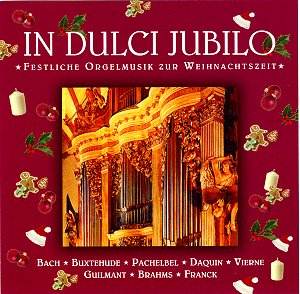In many ways this is a frustrating CD, particularly
for organ enthusiasts. Ferdinand Klinda is a Slovakian organist
who is a professor at the Bratislava Academy of Music. He has
previously released a disc devoted to historic organs in Slovakia.
Unfortunately this release gives no details of the organ used
for the recording, so listeners must make their own guesses as
to its provenance. Certainly the recital sounds as if it was all
recorded on the same, probably historic, organ.
It starts with a rather vivid performance of
the "Jesu, meine Freude". Klinda is certainly fond of
using the rather striking reeds on the organ. It is unfortunate
that the pedals come over as rather fuzzy and lacking in focus.
Bohuslav Cernohorsky is a name that is new to
me. He was an organist who was born in Bohemia, studied in Prague
and then entered the Franciscan Order. He was sent to Italy to
complete his theological studies and his double choir anthem,
Regina Coeli which was written in Assisi, dates from this time.
On his return to Prague he taught organ to Gluck for a time. His
Toccata is bright, attractive work. Buxtehude's brief fantasy
on 'In Dulci Jubilo" is one of his best known works.
As a leading performer on the instrument, Pachelbel
wrote a considerable amount of organ music, including a series
of organ chorales, based on well known Lutheran hymn-tunes. Other
organ music includes works in forms later used by Bach, fugues,
toccatas, fantasias and a set of six chaconnes. This choral prelude
on "Von Himmel Hoch" was published in 1693.
Domenico Zipoli trained in Naples with Alessandro
Scarlatti, joined the Domenican order in Seville then moved to
Argentina where he continued to play the organ until his death.
This "Pastorale" his is most well known piece. Both
this and the next piece,. Daquin’s "Noel", contain some
remarkable evocations of pfiferari, the Italian bagpipers. Daquin
is well known for the harpsichord piece "The Cuckoo",
but he worked at the Chapelle Royale and Notre Dame, Paris, and
was well known as an improviser. In France during the eighteenth
century, organ variations on well-known Christmas noëls were
a prominent feature at Midnight Mass and Louis-Claude Daquin was
considered the greatest master of the genre.
This group of baroque pieces could perhaps have
done with rather more variety and differentiation. Klinda uses
only a limited variety of registrations, perhaps he was limited
by the instrument. But these pieces also are lacking in élan,
something of the joy of the Christmas spirit. They are effective
enough, but don’t make you smile as they should.
In 1926-27 Louis Vierne composed four suites
entitled 'Pieces de Fantasies', planned as concert pieces for
an American tour. The pieces were a great hit and he was recalled
to the platform ten times at the Chicago performance. "Carillon
de Westminster" is from the "Pieces de Fantasies"
and is an atmospheric evocation of the Westminster Chimes. Guilmant
was organist at the Trinite in Paris, his "Pastorale"
is a charming, if rambling piece.
With the move to these French romantic pieces,
I started to feel the limitations of Klinda’s organ. Whilst his
registrations are never less than effective, the pieces do feel
the lack of the rich romantic registrations of Cavaillé
Coll’s instruments. This is, I am afraid, also true of the final
two pieces on the disc.
Robert Hugill
